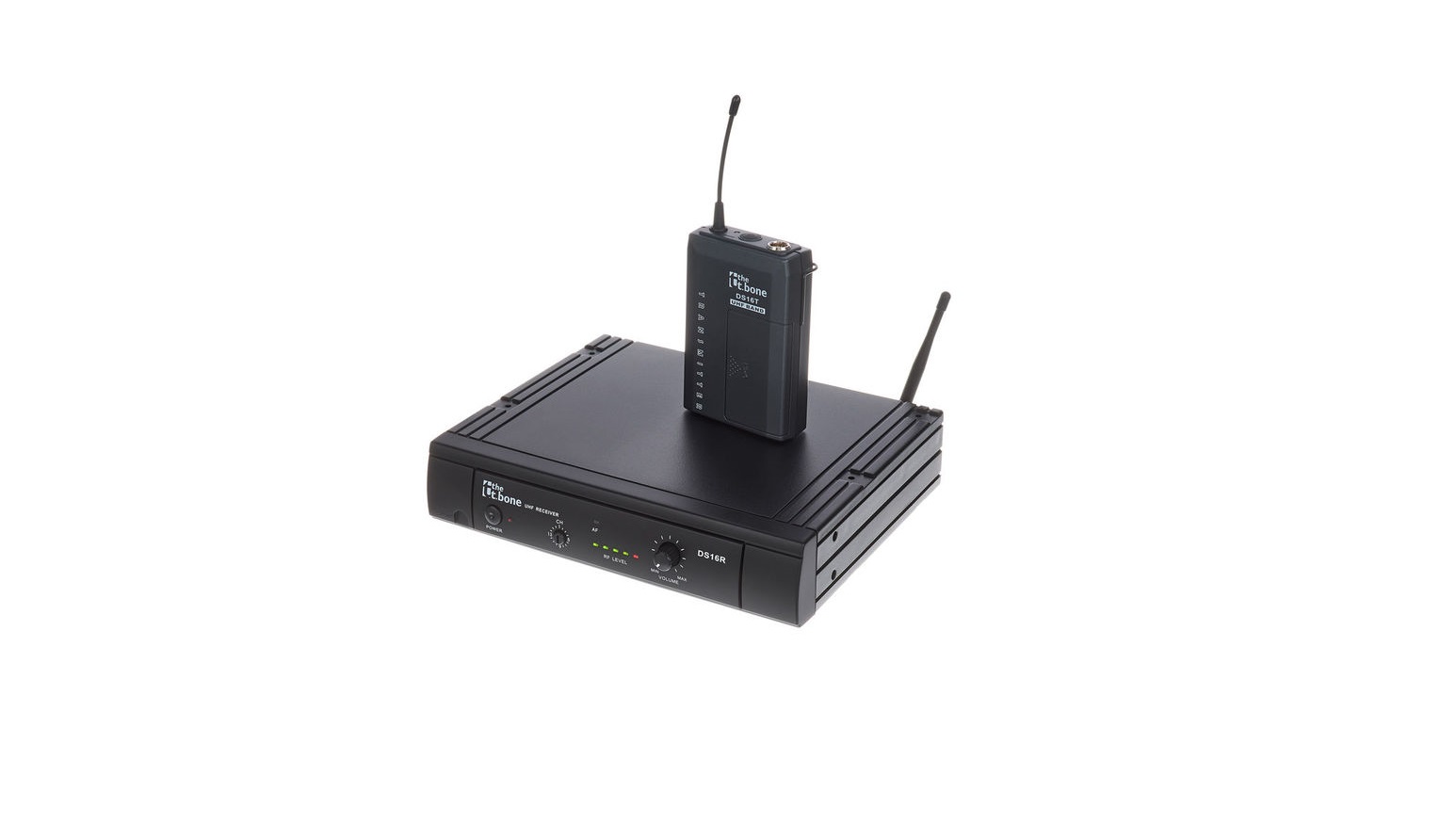Thomann Transmitter 16 T Transmitter User Guide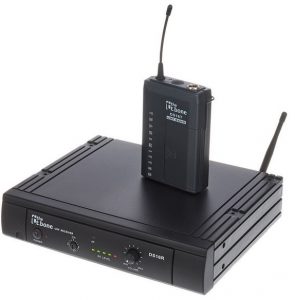
Quick Start GuideThis quick start guide contains important information on the safe operation of the product. Read and follow the safety advice and instructions given. Retain the quick start guide for future reference. If you pass the product on to others please include this quick start guide
Safety instructions
Intended useThis device is intended to be used for the wireless reception of audio signals in the wireless tour guide system TG 16. Any other use or use under other operating conditions is considered to be improper and may result in personal injury or property damage. No liability will be assumed for damages resulting from improper use.
Danger for children
![]() Ensure that plastic bags, packaging, etc. are disposed of properly and are not within reach of babies and young children. Choking hazard! Ensure that children do not detach any small parts from the product. They could swallow the pieces and choke! Never let children unattended use electrical devices.
Ensure that plastic bags, packaging, etc. are disposed of properly and are not within reach of babies and young children. Choking hazard! Ensure that children do not detach any small parts from the product. They could swallow the pieces and choke! Never let children unattended use electrical devices.
Where to use the productNever use the product
- in conditions of extreme temperature or humidity
- in extremely dusty or dirty areas
- at locations where the unit can become wet
General handling
- To prevent damage, never use force when handling the product.
- Never immerse the product in water. Just wipe it with a clean dry cloth. Do not use liquid cleaners such as benzene, thinners or flammable cleaning agents.
Notes on wireless transmissionThis device utilizes frequencies that are not harmonized within the European Union (EU) and therefore may only be used in certain EU member states. In all European countries, the frequencies used for the transmission of audio signals are strictly regulated. Before you start, make sure the frequencies are allowed in the respective country and check whether the operation must be reported to the appropriate authority. For more information, please visit: http://www.thomann.de.
- Make sure that transmitter and receiver are both tuned to the same channel.
- Never set multiple transmitters to the same channel.
- Make sure that there are no metal objects between the transmitter and receiver.
- Avoid interference from other radio or in-ear systems.
Electromagnetic compatibility with other electrical equipmentUsing the device near radios or TV sets may cause interference. Then increase the distance between the devices.
Incorrect handling of lithium batteries can result in injury
- In the event of a short circuit, overheating or mechanical damage, lithium batteries can cause severe injuries.
- When handled correctly and appropriately lithium batteries pose no risk.
- Store lithium batteries in a cool, dry place, ideally in the original packaging.
- Store lithium batteries away from heat sources (e.g. radiators or sunlight). Lithium batteries are hermetically sealed. Never attempt to open a lithium battery.
- If the battery housing is damaged small amounts of the electrolyte may leak out. If this should happen, seal the lithium battery in airtight packaging and wipe up the traces of electrolyte using absorbent paper towels. You must wear protective rubber gloves when doing so. Clean your hands and the affected surface thoroughly with cold water.
- Never attempt to recharge non-rechargeable lithium batteries. When charging lithium batteries you must use a suitable charging device intended for the purpose.
- Before disposing of the device remove the lithium batteries. Protect used lithium batteries against potential short circuits, e.g. by covering the poles with adhesive tape.
- Only use powder extinguishers or other suitable extinguishing agents to extinguish a burning lithium battery
Features
- Displays for set channel and operating status
- Integrated chargeable lithium battery
- Charging contacts for charger system TG C2 (item no. 234706) and TG C18 (item no. 235603)
- Built-in microphone
- Housing colour: Black
- 3.5 mm output for separate microphone
- Suitable earset microphone, cloth pouch for storage, band and belt clip included.
Controls and connections
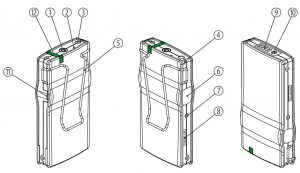
- [POWER] Main switch. Turns the device on and off.To turn the device on, press the button until the control LED lights up green. To turn the device off, press the button until the control LED turns off.
- [RESET] Reset button for resetting the device to factory defaults
- [MIC INPUT] 3.5 mm mini phone socket (mono) to connect the supplied earset microphone or another microphone
- Notches for threading the band
- Belt clip
- Display
- [CHANNEL] Channel selection button
- Indicating the frequency range in which the device operates. The indication here must match the information on the receiver
- Charging contacts
- [MIC] Built-in microphone
- [VOL] Volume control
- LED to indicate the operating status.The LED lights up green when the device is turned on.The LED lights up red when the charge of the built-in battery is too low.
Operating
Select channelThe display at the side of the device indicates the channel that is currently set. To change the setting, press the button underneath the display until the decimal point on the display flashes. If you briefly press the button now, you can change the channel number by one each time. The channel numbers are represented by the characters „0“ … „9“, „A“ … „F“.
If you do not press the button for about six seconds, the device works with the current settings. Transmitter and receiver must be set to the same channel.
Technical specifications
| Functional principle | PLL synthesized control |
| Inputs | 1 × 3.5 mm jack socket for microphone |
| Frequency of operation | 863 MHz … 865 MHz |
| Max. transmission power | 10 mW |
| Range (free field) | 50 m |
| Stability | ±0,005 % |
| Frequency deviation | ±48 kHz |
| Spurious emissions | < –50 dBC |
| NF frequency response | 40 Hz … 18 kHz |
| Battery Type | Lithium-ion |
| Voltage | 3.7 V |
| Operating time | 14 h |
| Charging time in the device | approx. 8 h |
| Dimensions (W × H × D) | 54 mm × 99 mm × 17 mm |
| Weight | 80 g |
| Ambient conditions | Temperature range: 0 °C…40 °C |
| Relative humidity: 20 %…80 % (non-condensing) |
A detailed user manual of the Tour Guide TG 16 is available for download on the product page of our homepage www.thomann.de.
 For the transport and protective packaging, environmentally friendly materials have been chosen that can be supplied to normal recycling. Ensure that plastic bags, packaging, etc. are properly disposed of. Do not just dispose of these materials with your normal household waste, but make sure that they are collected for recycling. Please follow the notes and markings on the packaging.
For the transport and protective packaging, environmentally friendly materials have been chosen that can be supplied to normal recycling. Ensure that plastic bags, packaging, etc. are properly disposed of. Do not just dispose of these materials with your normal household waste, but make sure that they are collected for recycling. Please follow the notes and markings on the packaging.
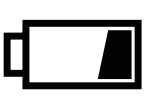 Dispose lithium batteries only in discharged condition. Remove replaceable lithium batteries from the device before disposal. Protect used lithium batteries from short circuits, for example by covering the poles with adhesive tape. Permanently installed lithium batteries must be disposed of together with the device. Please inquire about a suitable acceptance point.
Dispose lithium batteries only in discharged condition. Remove replaceable lithium batteries from the device before disposal. Protect used lithium batteries from short circuits, for example by covering the poles with adhesive tape. Permanently installed lithium batteries must be disposed of together with the device. Please inquire about a suitable acceptance point.
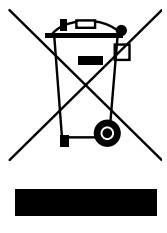 This product is subject to the European Waste Electrical and Electronic Equipment Directive (WEEE) in its currently valid version. Do not dispose of your old device with your normal household waste. Dispose of this product through an approved waste disposal firm or through your local waste facility. Comply with the rules and regulations that apply in your country. If in doubt, consult your local waste disposal facility
This product is subject to the European Waste Electrical and Electronic Equipment Directive (WEEE) in its currently valid version. Do not dispose of your old device with your normal household waste. Dispose of this product through an approved waste disposal firm or through your local waste facility. Comply with the rules and regulations that apply in your country. If in doubt, consult your local waste disposal facility
Thomann GmbH
- Hans-Thomann-Straße
- 96138 Burgebrac
- www.thomann.de
- [email protected]
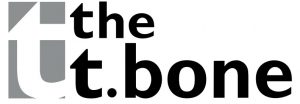
References
[xyz-ips snippet=”download-snippet”]

